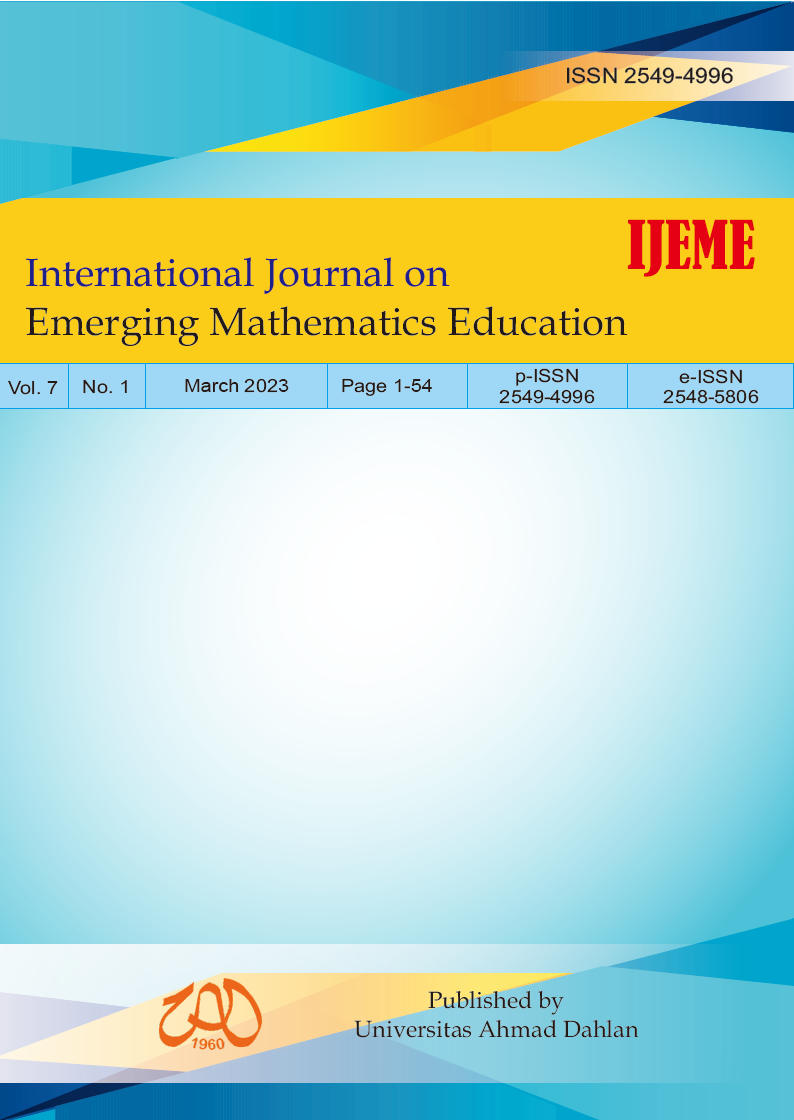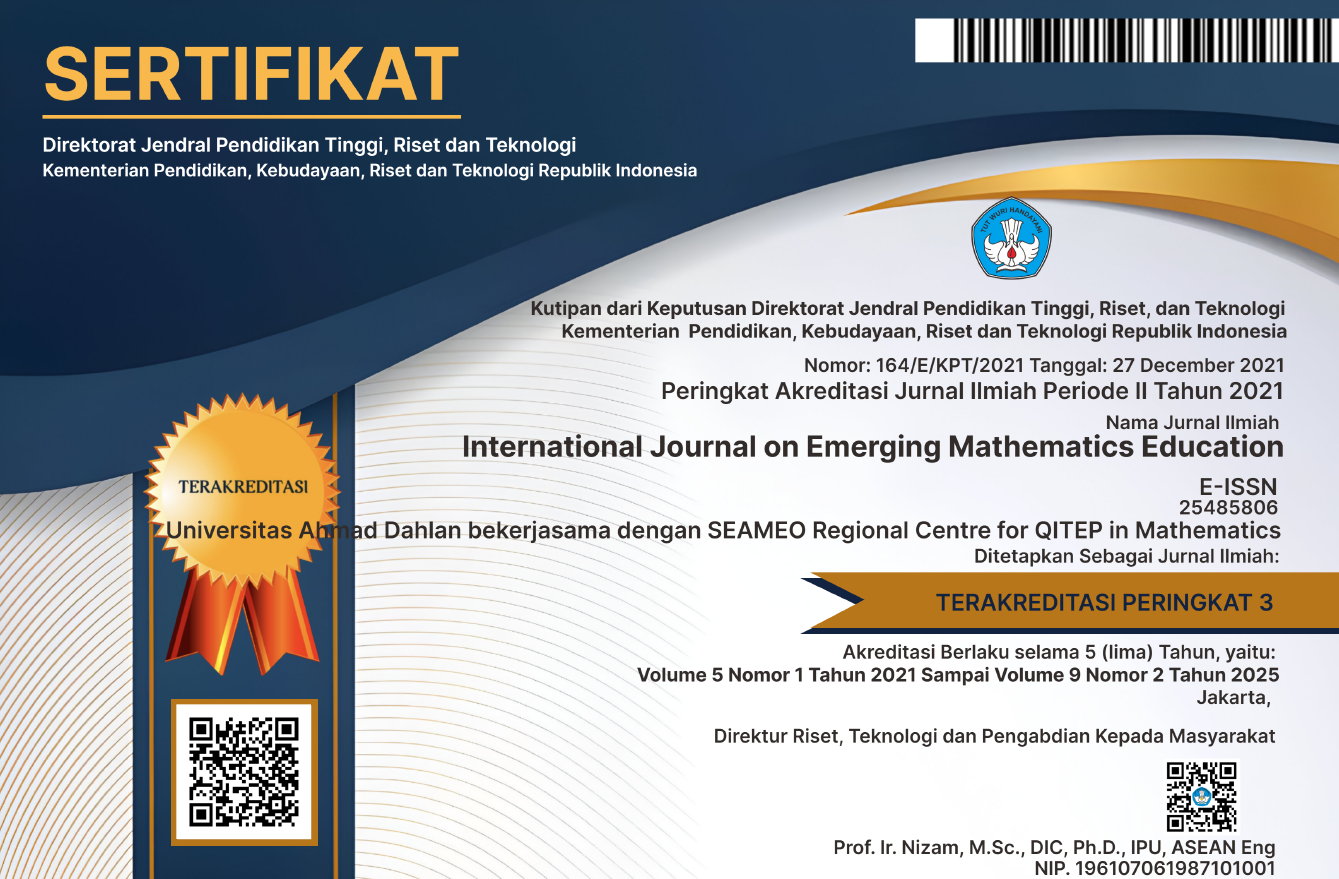Character Education in Mathematics Learning in Contemporary Era: A Case Study in Indonesia
DOI:
https://doi.org/10.12928/ijeme.v7i1.28149Keywords:
Character Education, IndonesiaAbstract
This research aimed to discover character education in the Contemporary Era. This research is qualitative phenomenological research. As the main instrument, researchers have long studied several library studies in the form of journal articles related to character education in mathematics learning in Indonesia. In addition, some descriptive data are obtained from the writer's experience studying character education over the last five years. Character development through mathematical teaching requires teachers to associate the character values they want to develop with the importance of mathematics and their learning. Then, teachers must be capable of planning and implementing their knowledge. The axiom is determined by agreement; thus, the deal is significant in mathematics. It will embed the agreement's value in the soul of every child who succeeds well when learning mathematics. Eventually, obedience will be inherited in the child's soul. A theorem is a broad range of factual statements and truths obtained from axioms using deductive reasoning. If, in mathematical learning the teacher succeeds in inserting the values contained in the relationship between theorem and axiom, the teacher can also integrate Pancasila values so that Pancasila is positioned like axioms. In short, contextual and contemporary mathematical learning plays a significant role in developing skills essential to modern society and the formation of national character.References
Fukuyama, M. (2018). Society 5.0: Aiming for a New Human-Centered Society. Japan Spotlight.
Miles, M. B., & Huberman, A. M. (1994). Qualitative data analysis: An expanded sourcebook. Sage.
Poluakan, M. V., Dikayuana, D., Wibowo, H., & Raharjo, S. T. (2019). Potret Generasi Milenial pada Era Revolusi Industri 4.0. Focus: Jurnal Pekerjaan Sosial, 2(2), 187-197.
Risdianto, E. (2019). Analisis pendidikan indonesia di era revolusi industri 4.0. April, 0–16. Diakses pada, 22.
Savitri, A. (2019). Revolusi industri 4.0: mengubah tantangan menjadi peluang di era disrupsi 4.0. Penerbit Genesis
Downloads
Published
How to Cite
Issue
Section
License
License and Copyright Agreement
In submitting the manuscript to the journal, the authors certify that:
- They are authorized by their co-authors to enter into these arrangements.
- The work described has not been formally published before, except in the form of an abstract or as part of a published lecture, review, thesis, or overlay journal. Please also carefully read the International Journal on Emerging Mathematics Education (IJEME) Author Guidelines at http://journal.uad.ac.id/index.php/IJEME/about/submissions#authorGuidelines
- That it is not under consideration for publication elsewhere,
- That its publication has been approved by all the author(s) and by the responsible authorities, tacitly or explicitly, of the institutes where the work has been carried out.
- They secure the right to reproduce any material that has already been published or copyrighted elsewhere.
- They agree to the following license and copyright agreement.
Copyright
Authors who publish with the International Journal on Emerging Mathematics Education (IJEME) agree to the following terms:
- Authors retain copyright and grant the journal the right of first publication with the work simultaneously licensed under a Creative Commons Attribution License (CC BY-SA 4.0) that allows others to share the work with an acknowledgment of the work's authorship and initial publication in this journal.
- Authors are able to enter into separate, additional contractual arrangements for the non-exclusive distribution of the journal's published version of the work (e.g., post it to an institutional repository or publish it in a book), with an acknowledgment of its initial publication in this journal.
- Authors are permitted and encouraged to post their work online (e.g., in institutional repositories or on their website) prior to and during the submission process, as it can lead to productive exchanges, as well as earlier and greater citation of published work.
![]()
Ciptaan disebarluaskan di bawah Lisensi Creative Commons Atribusi-BerbagiSerupa 4.0 Internasional.





